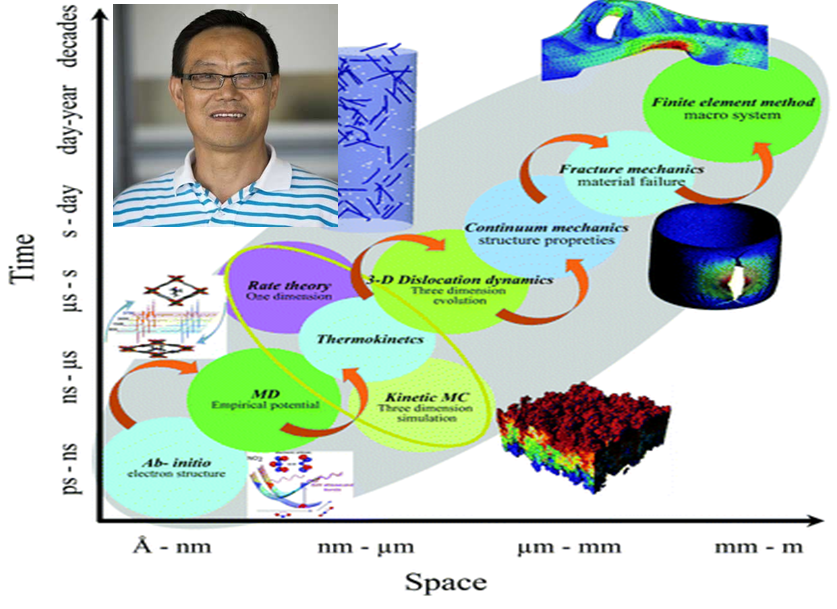NOMATEN SEMINAR: Multi-scale Computer Simulations of Materials
Tuesday, JUNE 21st 2022 15:00 (3.00PM CET)
Multi-scale Computer Simulations of Materials
Prof. Fei Gao, Department of Nuclear Engineering and Radiological Sciences, University of Michigan, Ann Arbor, Michigan 48109, USA
Abstract:
The recent developments of multiscale computer modeling to simulate materials behavior in an extreme environment, including ab initio calculations, self-consistent accelerated molecular dynamics, advanced kinetic Monte Carlo (KMC) methods, and phase field modeling, will be reviewed. I will firstly focus on the application of multiscale modeling to study microstructural evolution in multicomponent equiatomic alloys under irradiation and some interesting results will be highlighted. These simulations provide the detailed mechanisms on the generation and evolution of irradiation-induced defects in face-centered cubic MEAs and HEAs to understand the new mechanisms of their irradiation tolerance. In addition, an object kinetic Monte Carlo based long-time dynamics is developed to simulate void formation, stacking fault tetrahedron (SFT) nucleation and defect accumulation at experimentally relevant time-scale for the first time in multicomponent equiatomic alloys.
Secondly, a self-adaptive accelerated molecular dynamics (SAAMD) method, which has been developed previously, is used to model infrequent atomic-scale events. This approach is self-evolving and can be applied to the coupled motion of fast and slow dynamics. We applied SAAMD to study evolution of nanosize clusters and dislocation loops in Fe, including (1) a helium-rich He-V cluster migration by an interstitial-assisted mechanism; (2) helium bubble formation and growth. Finally, I will discuss how the atomic-level results can be used to inform mesoscale methods, such as phase field model, to study the growth of gas bubbles and their effects on the mechanical properties of nuclear fuels.
Bio:
Prof. Fei Gao continued his study in UK after graduating from Lanzhou University and received his Ph. D degree in Material Science and Engineering from the University of Liverpool of UK in 1991. Since then, He worked at University of Liverpool and Pacific Northwest National Laboratory of USA (PNNL), as senior research scientist and chief scientist, as we as an adjunct professor Washington State University of USA. Since 2014, Dr Gao joined the Department of Nuclear Engineering and Radiological Sciences in University of Michigan. Dr. Gao is a full professor in both Department of Nuclear Engineering and Radiological Sciences (NERS) and Department of Material Science and Engineering (The NERS has been ranked as the No.1 Department of Nuclear Engineering in USA for last ten years). Prof. Gao’s current work mainly focuses on ion-solid interaction, irradiation damage, detector materials, nanostructures properties, Li+ ion battery, development and application of multi-scale modeling of materials, and so on. He has fitted several interatomic potentials of metals, semiconductors and ceramics based on ab-initio calculations. His group has employ a variety of computational tools to carry out multi-scale simulations, including quantum-mechanical calculations, ab-initio molecular dynamics, time-dependent density functional theory, tight-binding calculations, molecular static and dynamic calculations, monte-Carlo annealing simulations and self-consistent accelerated molecular dynamics. Prof. Gao has published more than 350 refereed journal papers, including PRL,Nature Communication, Energy & Environmental Science, Nano letter, ACS Nano, PNAS, Advanced Materials, Angewandte Chemie International Edition, Acta Materialia, PRB, APL, JAP, etc., which have been cited more than 15131 times according to SCI, with an H-index of 59. He has been an associated editor of AIP (American Institute Physics) Advances, editorial board of Scientific Reports and a guest editor for a number of journals. Prof. Gao has organized or chaired a number of international conferences about multi-scale computer simulation. He is in international advisory committee for international conference on Computer Simulations of Radiation Effects in Solids, one of the program committee members for international conference on hard x-rays, γ-rays and neutron detector physics, and the secretary-general of the 16th international conference on fusion reactor materials. Prof. Gao has been PI for more than 40 scientific research projects, which is supported by grants totaling about tens of millions of dollars in research funding. He has delivered more than 200 invited talks at international conferences and department seminars. Prof. Gao has been awarded for his outstanding performance more than four times by the U. S. Department of Energy and PNNL. His works in nuclear materials and related fields have been widely recognized by national and international top experts.










